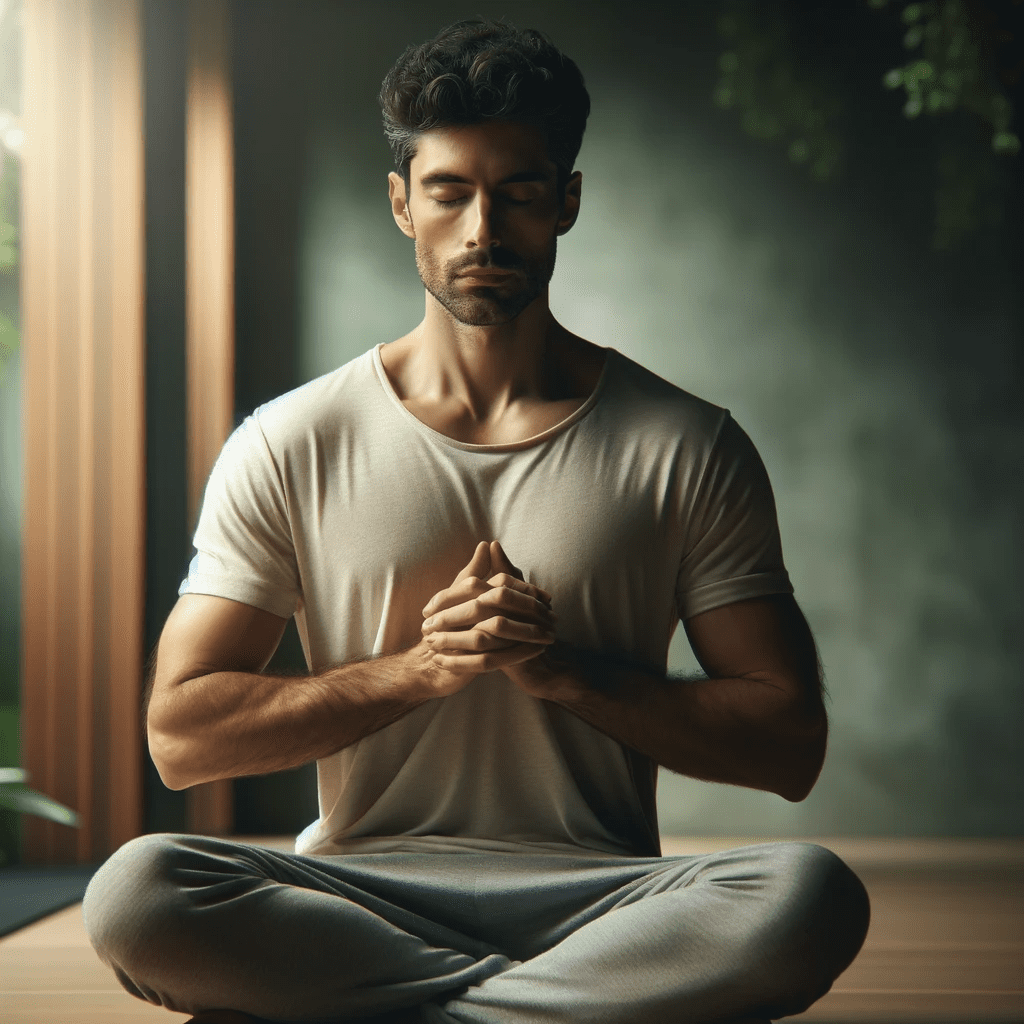Meditation

What is Meditation
The term Meditation is difficult to define but broadly speaking it is a practice to help one to relax, relieve stress and improve general well being.
It can be transformative and as it often involves considerable self reflection (depending on the technique), it does help with personal growth and development.
Meditation is often associated with ” being spiritual” but there is copious high quality scientific research to show it has real and long lasting benefits.
I did not start a practice to gain spiritual enlightenment. I was always shy and anxious growing up and I needed something to reduce this.
I find it reduces my anxiety, improves my intuition and creativity and generally makes ame a nicer person to be around.
Meditation for some people may be sitting in the garden watching the birds, for others it could be painting.
I remember buiding a model plane when I was a kid and started in the early evening. I became so absorbed that I looked up again and it was 3am. I realised I was also freezing cold as I had the window open to take away the fumes of the balsa adhesive.
I briefly thought about how could I have been so focused that I was not aware of myself but just was at one with the task and whether this was a good thing or not.
Meditation is an ancient practice which is difficult to define but it transcends cultures and religions, yet it is universally recognized for its deep-rooted history in fostering human well-being.
At its essence, meditation involves the training of attention and awareness to achieve a mentally clear and emotionally calm state.
Over the centuries, it has evolved to encompass a variety of techniques and traditions, each with its unique approach but unified by the common goal of enhanced self-awareness and a sense of inner peace.
The roots of meditation stretch back to ancient times, appearing in diverse forms in various religious and spiritual traditions.
In Hinduism, meditation is an integral part of yoga, as outlined in the Vedas and the Bhagavad Gita. Buddhism, particularly in its Zen and Tibetan branches, emphasizes meditation as a means to awaken to the true nature of reality and achieve enlightenment.
Similarly, in Taoism, meditation practices are employed to align oneself harmoniously with the Tao, or the fundamental principle of the universe.
Even in the Abrahamic religions – Judaism, Christianity, and Islam – contemplative practices resembling meditation are found, aiming to deepen one’s connection with the divine.
Scientific Research
As meditation has strong associations with religious and spiritual traditions, one of the main critisisms, is that it is just superstitious nonsense which has no place in our high tech, sophisticated, modern world.
I come from a science and enginnerring background and for years I dismissied anything related to religion or spirituality (including meditation) as nonsense.
However, after some reseaqrch I was surprised that there is an ever growing body of high quality scientific research which clearly demonstrates the value of a meditaion practice.
There is also the realm of sub atomic and quantum physics which has shown that reality is not solid but everything is energy
The research is often on a specific technique, such as Transendental meditation ( one of the most researched techiniques) or mindfulness.
In addition modern scientific developments and discoveries are showing that life is ever more mysterious than on first impressions.
The Hard Problem of Consciousness still has not been settled ( we still do not know what consciousness is or where it comes from- does the brain produce consciousness or does consciousness produce the brain and everythng else?)
Sub atomic and Quantum physics show that everything is in essence just empty space.
Things are made from compounds, compounds are made from molecules, molecules are made from atoms, atoms are amde from protons, neutrons and electrons, they are made from…..
So the more one divides the discrete particles even smaller sub atomic particles will be found which will be made up of even smaller particles.
The particles are all captured within vast tracts of seemingly empty space, held in position by intermolecular forces such as Van der Waals forces.
The amount of energy withing just a few atoms is alarmingly demonstrated in an atomic bomb detonation- A nuclear fission reaction causes the nucleus of an atom sto split into two or more smaller nuclei, along with the release of a large amount of energy.
So it is obvious that there is nothing really solid, it is just energy vibrating.
Why Meditate?
Listen to our beach meditation recorded at beautiful Port Macquarie, New South Wales, Australia to help you drift off to sleep or try this two minute technique to help you regain your composure in stressful and challenging situations.
Most people meditate just to relax and the more one does it the longer lasting the beneficial effects will be. The longer one practices the more its effects will start to show.
After a while you may realise that you arent perpetually worried about something inconsequential (and the mind will always find something to worry about, so dont be fooled into thinking once this petty issue is clear I will be free. No, there WILL be the next thing served up to worry about).
Your sleep may improve, you wont stress about giving a presentation in work and in many cases life just starts to flow and good things may just start to show up.
There are several techniques including Mindfullness, focus on object, transcendental meditation, kriya, kundalini, mantra, manifestation, vipassanaa, watching the breath, yoga nidra, and Zen.
Chakra Meditation is very effective and a personal favourite.
Dive deep into the teachings of spiritual masters like the Buddha, Papaji, Nisargadatta, Ramana Maharshi, Eckhart Tolle, Imogen, Jeddah Mali, Loch Kelly, Mooji, Michael Singer, Rupert Spira, Sadhguru, and Dr. Joe Dispenza.

Large Companies
Meditation has long been recognised by business and comapnies large and small.
Contented, self directed employees will enjoy working for the company and be more creative, more efficient and more productive.
Many notable industry leaders had or have a meditation practice, for example:
Steve Jobs – The late co-founder and CEO of Apple was well-known for his interest in Zen Buddhism and meditation. Jobs’s practice of Zen meditation was a significant influence on his vision for Apple and his approach to design and business.
Marc Benioff – The CEO of Salesforce is a known advocate of mindfulness and meditation. He has integrated mindfulness spaces within the Salesforce offices and often discusses the importance of meditation in maintaining his leadership and creativity.
Jeff Weiner – The former CEO of LinkedIn has spoken openly about his daily meditation practice. Weiner has attributed meditation to helping him manage his professional and personal life more effectively.
Ray Dalio – The founder of Bridgewater Associates, one of the world’s largest hedge funds, is a long-time practitioner of Transcendental Meditation. Dalio has credited meditation with playing a role in his professional success and personal fulfillment.
Arianna Huffington – The co-founder of The Huffington Post and CEO of Thrive Global, Arianna Huffington, has been vocal about the benefits of meditation for well-being and productivity. She encourages meditation practices as part of a healthy lifestyle for reducing stress and improving decision-making.
Also many other small and large companies encourage an interest in these subjects; most notably Google has regular talks to its employeees on mindfulness and meditation.

Videos
FAQ
Meditation, often misunderstood, sometimes feared, finds a platform at meditationport, where its true essence is explored and celebrated.
Here are just some of the questions people have regarding meditation. There are many more listed throughout the site
Discover the transformative power of this ancient practice and embrace its potential for inner peace and self-discovery.

Will it require a lot of time?
No. Many people spend just a few minutes a day meditating. but 20 minutes to an hour is common.
I personally meditate twice a day an hour before I start work and an hour in the evening.
If I meditate will I loose motivation and become a reclusive hermit?
Definetly not. Meditation is scientifically proven to make you calmer, more focussed and creative. It will help make you the person you were born to be.
In fact, Michael A Singer, one of the most well known” Spiritual teachers” became a billionaire, owner of a software portal you have probably used.
But converseley you may want a simple life. It all depends on what makes you happy, content and your “Dharma”.
Will people think I'm weird?
It depends on who you speak to. But maybe at first keep it to yourself.
When they see the new you chances are they will ask what you are doing.
Meditation is nothing to be feared, in fact most of it will do it naturally, without realising we are meditating, at some satges in their lives.
Isn't meditation a lot of mumbo jumbo nonsense? ?
No, it has been scientifically proven to be extremenly beneficial. ( See the scientific research section in the site) It will make you more alert, focussed, creative and able to cope.
For example Mindfullness Meditation is non secular and is a recognised therapy to aid mental health and well being.
Research has been carried out into other modes of meditation, eg Transcendental Meditation, Tibetan, Buddhist – you name it.

